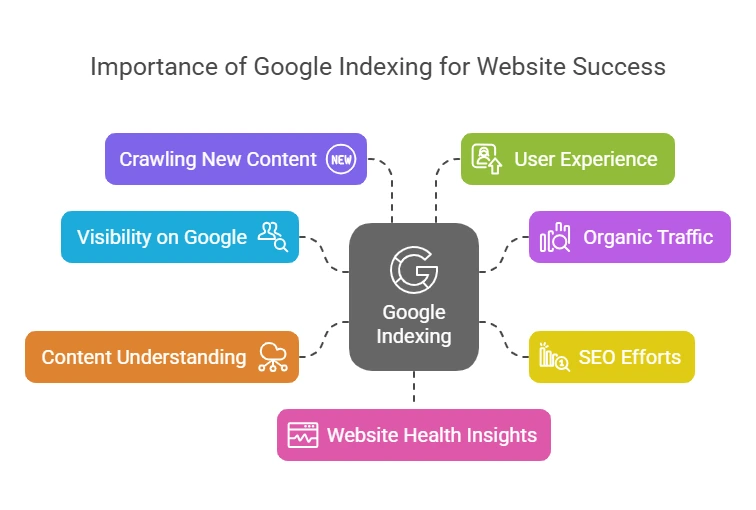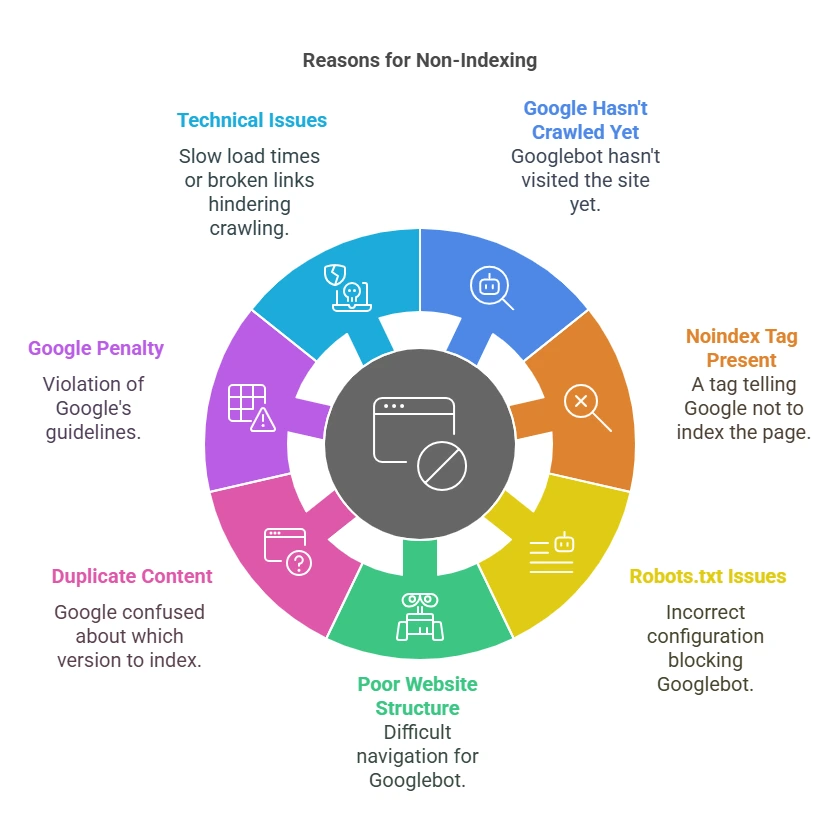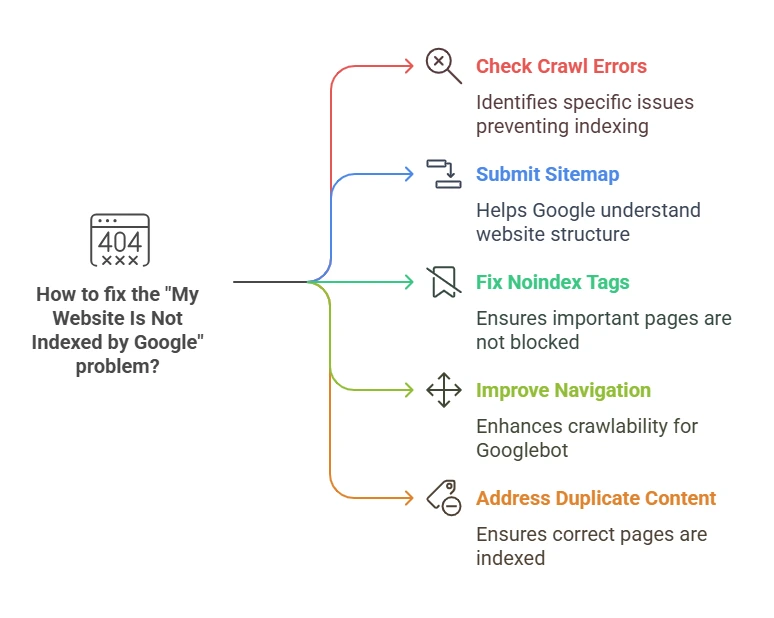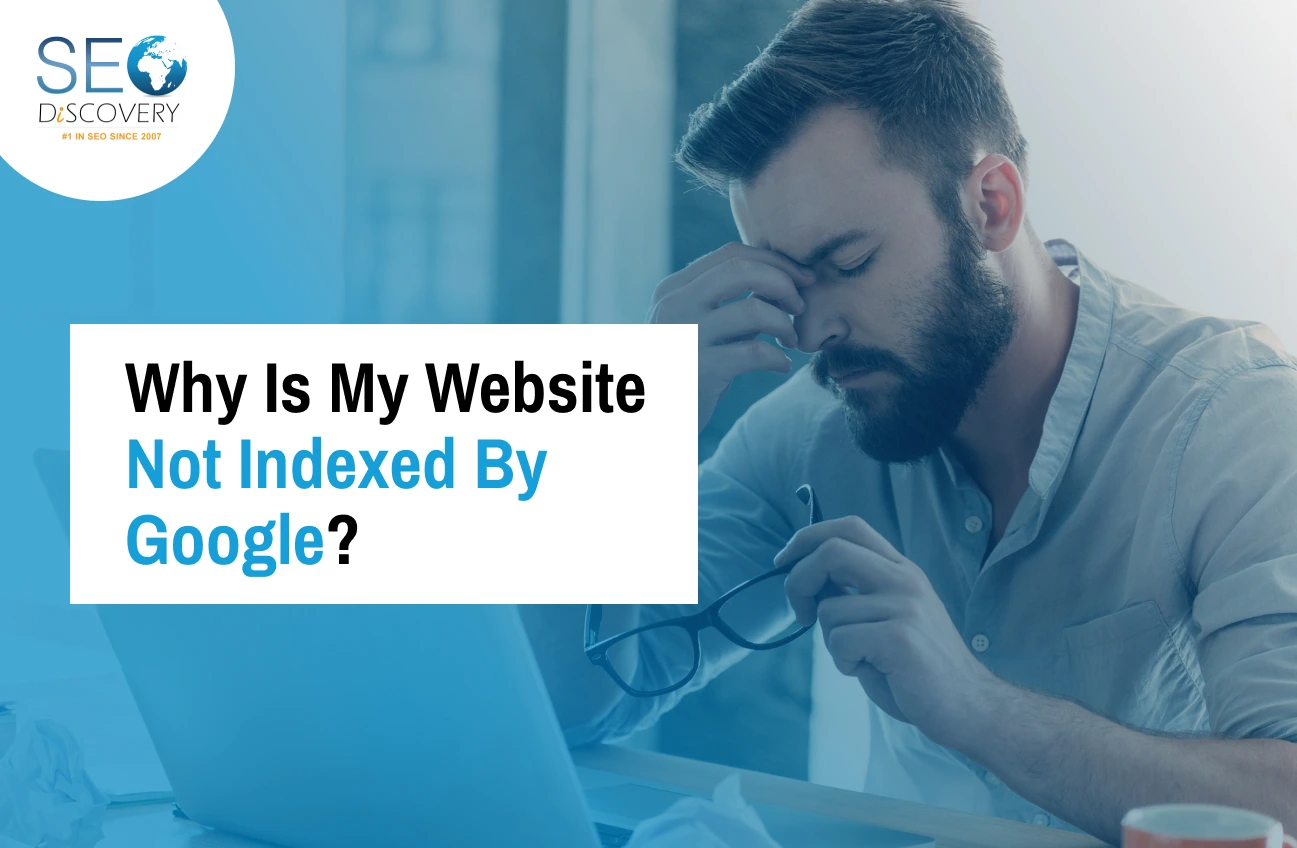You’ve put a lot of effort into building your website – designing it, adding content, and making sure it looks great.
But when you search for it on Google, it’s nowhere to be found. This can be incredibly frustrating, especially if you’re counting on search traffic to grow your business.
Did you know that nearly 96.55% of web pages don’t get organic traffic from Google simply because they’re not indexed properly?
Over half of all websites face some sort of indexing issue, making them invisible to potential visitors.
When Google doesn’t index your website, it’s like you’ve built a store on a street no one walks down.
That’s where working with an experienced SEO company can make all the difference. With the right technical expertise, you can identify and resolve indexing issues quickly.
In this blog, we’ll explore why your website might not be indexed by Google and what steps you can take to fix it and get your site the visibility it deserves.
Table of Contents
- What Is Indexing?
- Why Google Indexing Is Important
- Common Reasons Why Google Might Not Index Your Website
- How Often Does Google Index Websites?
- Why Is Indexceptional the Best Google Indexing Tool for Websites?
- Automated Website Indexing: How It Helps
- How to Fix the “My Website Is Not Indexed by Google” Problem
- How SEO Discovery Can Help Your Website Get Indexed and Rank Higher
- FAQs About Why Is My Website Not Indexed By Google
What Is Indexing?
Indexing is the process by which Google (and other search engines) discover, crawl, and organize the content of a website so that it can be displayed in search results when users search for relevant terms. In simple terms, indexing is like a librarian categorizing and filing books in a library. When Googlebot (Google’s web crawler) visits your website, it reads your content, understands what the page is about, and stores that information in Google’s vast index.
This index is essentially a massive database of all the pages Google has crawled and is ready to show in its search engine results when users search for relevant queries. Without indexing, your pages would not be found by Google, and as a result, your website would not appear in search results. Therefore, indexing is a crucial step in making your website discoverable and driving traffic from search engines.
Why Google Indexing Is Important

Google indexing plays a vital role in your website’s visibility and success. If your website isn’t indexed by Google, it won’t appear in search results, no matter how high-quality or relevant your content is. Let’s break down why Google indexing is so important for your website:
1. It Makes Your Website Visible on Google
If your pages aren’t indexed by Google, they simply won’t show up in search results. Google’s search engine is like a massive directory, and unless your website is indexed, it doesn’t exist in that directory. Without indexing, you can’t expect people to find your site through organic search.
2. It Drives Organic Traffic
Once your pages are indexed, they have the potential to rank in search results based on relevant queries. Organic traffic is a primary source of website visitors, and having your pages indexed allows Google to recommend your content to people who are actively searching for what you offer. Indexing is the first step in the process of gaining traffic from Google.
3. It Affects Your SEO Efforts
Search engine optimization (SEO) is all about improving your website to rank higher in search results. But none of your SEO efforts will matter if Google doesn’t index your pages. Indexing is foundational to SEO – without it, Google cannot even assess the quality of your content, let alone rank it. When your pages are indexed, they can be evaluated for their relevancy and quality, which are essential ranking factors.
4. It Helps Google Understand Your Content
Google indexing helps Google understand the content on your website. When your pages are indexed, Google reads the content and can categorize it based on topics and keywords Research. This enables Google to match your website with user search queries. The more accurately Google understands your content, the better your chances of ranking for relevant searches.
5. It Enables Crawling of New Content
When Googlebot indexes your website, it keeps track of updates and changes to your site. If you regularly publish new content, Google will crawl and index those new pages, ensuring that they’re included in search results. This is crucial for keeping your content fresh and relevant, which can help improve your search rankings over time.
6. It Enhances User Experience
Proper indexing improves the overall user experience. When your pages are indexed and appear in search results, users can find relevant content easily. This not only drives traffic but also ensures that people are directed to high-quality, useful information. Additionally, optimizing for Core Web Vitals—Google’s metrics that assess page loading performance, interactivity, and visual stability—enhances this experience further. If your content isn’t indexed, users won’t be able to access it via search engines, limiting your website’s reach.
7. It Provides Insights into Your Website’s Health
Through Google Search Console, you can monitor the indexing status of your website. If your pages aren’t indexed or if there are issues with the crawling process, you can identify and fix them. Monitoring indexing status helps you catch any problems early and maintain a healthy website that ranks well in Google search results.
Ready to Be Seen by Your Audience? Let’s Fix Your Indexing and Rank Higher!
Common Reasons Why My Website Is Not Indexed By Google

If your website is not showing up on Google, you are not alone. Many businesses struggle with this issue, and it is a common challenge that can be caused by a number of factors. To get your site indexed and ranked by Google, understanding the indexing process is key.
Google’s indexing process involves crawling your site, analyzing the content, and storing it in a massive database. However, if something goes wrong in this process, your website can remain unindexed. Let’s explore the common reasons why Google might not index your website:
1. Google Hasn’t Crawled Your Website Yet
If your website is brand new, Google may simply not have crawled it yet. Googlebot, the web crawler used by Google, constantly scans the web for new content. However, it doesn’t crawl every page immediately. Sometimes, Google might not crawl your website for several days, weeks, or even months, depending on various factors such as site authority, content quality, the use of content writing services, and your website’s crawl budget.
It’s important to note that Google prioritizes the crawling of popular and authoritative websites, so new websites might take longer to get crawled. But don’t worry—with time, effort, and possibly the help of professional content writing services to improve the relevance and quality of your pages, Google will eventually index your site.
2. Your Website Has a Noindex Tag
One of the most common reasons your website isn’t being indexed is due to the presence of a noindex tag on your pages. This tag tells Google to avoid indexing the page. It’s typically used for pages like login screens or duplicate content that you don’t want to appear in search results.
If you’ve accidentally added this tag to your homepage or other important pages, Google will avoid indexing them. To fix this, you need to ensure that your website doesn’t have the noindex directive on any pages you want to appear in search results.
3. Issues with Your Robots.txt File
Another potential reason for indexing issues is your robots.txt file. This file is used to instruct web crawlers, including Googlebot, on which pages of your website to crawl and which ones to avoid. If your robots.txt file is configured incorrectly, it might block Google from crawling important pages, preventing them from being indexed.
To check if your robots.txt file is blocking any important pages, you can use Google Search Console’s robots.txt Tester tool to identify any issues.
4. Poor Website Structure and Navigation
Googlebot needs to be able to easily crawl your website to index its pages. If your site has poor navigation or a complex structure, it could make it difficult for Googlebot to find all your pages. For instance, pages that are buried deep within the site or lack internal links may not be crawled or indexed.
Investing in professional web design services can help ensure your website has a clear, well-organized structure with an intuitive navigation system. Adding a sitemap to your website can also help Googlebot understand the structure of your site and improve the chances of indexing your pages.
5. Duplicate Content Issues
If your website has duplicate content, it can confuse Google about which version of the page to index. Duplicate content often occurs when the same content appears on multiple pages or when your site is accessible via multiple URLs.
Google may decide not to index one of the duplicate pages to avoid redundancy in search results. To resolve this, you can use canonical tags to tell Google which version of the page should be indexed, or set up proper redirects to point to the correct page.
6. Your Website is Penalized by Google
If your website has been penalized by Google, it may be removed from the search index altogether. Penalties are usually a result of violating Google’s guidelines, such as engaging in black-hat SEO tactics, having too many low-quality backlinks, or using manipulative techniques like keyword stuffing.
If you suspect that your site has been penalized, you can check for manual actions in Google Search Console. You can also address the issues that led to the penalty and submit a reconsideration request to Google.
7. Technical Issues with Your Website
Sometimes, technical problems can prevent Googlebot from crawling and indexing your website. These issues can include things like slow page load times, broken links, or server errors. If Googlebot encounters errors when trying to crawl your website, it may skip certain pages or fail to index them entirely.
You can use tools like Google Search Console to identify crawl errors and fix them. Additionally, optimizing your website’s performance can help ensure that Googlebot can easily crawl and index your pages. Investing in technical SEO audit services can also provide a comprehensive analysis of your site’s health, helping you uncover hidden issues and implement effective solutions.
How Often Does Google Index Websites?
Google doesn’t index websites on a set schedule. How often your website is indexed depends on several factors, including the frequency of content updates and the authority of your site. Larger, more authoritative websites are crawled and indexed more frequently than smaller, newer sites.
For established sites, Googlebot may crawl your pages daily, weekly, or even multiple times a day. On the other hand, new websites or pages may not get crawled as often. However, this doesn’t mean that Google has completely ignored your site—it just takes time for Googlebot to crawl everything.
To encourage faster indexing, ensure your website has high-quality, regularly updated content and make use of tools like Google Search Console to submit your sitemap.
Why Is Indexceptional the Best Google Indexing Tool for Websites?
If you’re struggling with indexing issues, tools like Indexceptional can help. This tool is designed to speed up the indexing process by automating the submission of your website to search engines. Indexceptional is known for its ability to efficiently index websites, reducing the time it takes for your pages to appear on Google.
Unlike other SEO tools, Indexceptional uses advanced algorithms to ensure that your pages are indexed properly and quickly, even if your website has a lot of content or is large in size. This tool ensures that all pages are crawled and indexed in a timely manner, giving you the best chance of ranking in search results.
Automated Website Indexing: How It Helps
Automated website indexing refers to the process of using software or tools to automatically submit your website’s pages to Google and other search engines for indexing. This eliminates the need for manual submission, saving time and ensuring that all your content gets crawled and indexed quickly.
With automated website indexing tools, you can ensure that your site’s new pages are indexed faster, helping you maintain visibility on search engines. This is especially useful for sites that frequently add new content, as it allows for quicker crawling and indexing.
By leveraging automated indexing tools, you can ensure that your content reaches Google in the shortest amount of time, helping you get noticed by your target audience sooner.
How to Fix the “My Website Is Not Indexed by Google” Problem

If your website is not indexed by Google, it is important to take action to resolve the issues. Here are some steps you can follow:
- Check for Crawl Errors: Use Google Search Console to check if there are any crawl errors on your website. This will give you a clear picture of why your pages aren’t being indexed.
2. Submit a Sitemap: If you haven’t already, submit a sitemap to Google Search Console. This will help Googlebot understand the structure of your website and index your pages more effectively.
3. Fix Noindex Tags: Ensure that you haven’t accidentally added a noindex tag to your important pages. This can be checked through Google Search Console or by inspecting the page’s HTML code.
4. Improve Website Navigation: Make sure your website has an easy-to-follow structure that allows Googlebot to crawl all pages. Adding internal links to important pages can help Google discover them.
5. Address Duplicate Content: Use canonical tags or 301 redirects to manage duplicate content issues and ensure that the correct pages are indexed.
How SEO Discovery Can Help Your Website Get Indexed and Rank Higher
At SEO Discovery, we specialize in helping businesses like yours get the visibility they deserve. If your website is not being indexed by Google, we can identify the root cause and take corrective action to get your pages indexed quickly and efficiently. Our team of SEO experts will perform a thorough analysis of your site, from crawl errors to duplicate content issues, and implement the right strategies to ensure Google indexes your website.
As the best digital marketing agency, we can also help enhance your site’s SEO performance, ensuring it ranks higher on Google once it’s indexed. From optimizing your website’s structure and navigation to improving content quality and fixing technical issues, we have the tools and strategies needed to maximize your site’s visibility.
Let SEO Discovery help you with:
- Ensuring your website is properly indexed
- Fixing technical SEO issues that affect indexing
- Creating a user-friendly site structure that Google loves
- Leveraging the power of digital marketing agency services to drive organic traffic and grow your online presence
Want Your Website to be Indexed and Rank Higher? We Can Help Fix the Issues and Get Your Site Noticed by Google!
FAQs About Why Is My Website Not Indexed By Google
If your website isn’t appearing on Google, it might not be indexed. Google needs to “crawl” your site and add it to its index before it can show up in search results. If your pages aren’t indexed, they won’t show up in search, no matter how good your content is.
You can check if your site is indexed by doing a simple search on Google. Type “site:yourdomain.com” into the Google search bar. If your pages appear, they’re indexed. If not, your site might not be indexed yet.
The time it takes for Google to index a new website can vary. It could be anywhere from a few days to several weeks. Google usually indexes larger, well-established sites more quickly. However, with the right steps, like submitting a sitemap, you can speed up the process.
If your website isn’t indexed, there are a few things you can do. First, check for any crawl errors in Google Search Console. Make sure your website doesn’t have a “noindex” tag by mistake, and ensure your site structure is easy to navigate. You can also submit a sitemap to Google, which can help it understand your website better.
Yes, if your pages have a “noindex” tag, Google will avoid indexing them. This tag is usually used for pages you don’t want to appear in search results, like duplicate content or login pages. If important pages on your site have this tag, remove it to ensure they get indexed.
To improve your website’s indexing, make sure it has a clean structure with good internal links. Avoid duplicate content and ensure your pages load quickly. You can also use Google Search Console to submit a sitemap and check for crawl errors.
A sitemap is like a map for search engines. It lists all the important pages on your site so Googlebot can easily find and index them. Submitting a sitemap to Google Search Console can help your site get indexed more efficiently, especially if it’s large or has many pages.
Yes! SEO Discovery can help ensure your website is indexed properly. We can identify any issues, like crawl errors or technical problems, and fix them. We also help optimize your site’s structure, content, and performance to improve your chances of ranking well on Google once your site is indexed.


